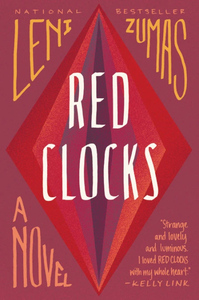Take a photo of a barcode or cover
This was a perfectly okay piece of realism that demonstrates how a set of people can have very different perspectives of the same issue, but I can't say anything amazing about it. It certainly isn't "ferociously imaginative," as the cover claims. The "ferociously imaginative" world in which abortion is illegal feels like...tomorrow? Even the multi-perspective structure -- 4 women in contemporary Oregon and 1 19th century explorer whose story has been lost -- isn't super clever. The women's lives are entangled because they live in the same small coastal town, and the Biographer's interaction with the explorer's diary isn't profoundly affective to anyone but herself (and even that is debatable, in a way).
Ultimately the story asks each of these women to think about what makes a good life, while the world they live in asks (as the cover states) "what is a woman for?" It paints a portrait of how women can nurture and poison each other, how women's bodies are used to figuratively and literally feed others, and it doesn't settle on any one-sized-fits-all moral answer.
Again, as a piece of realism, that is a little too close for comfort at the moment, it's fine -- just not the type of fiction I'm interested in.
Ultimately the story asks each of these women to think about what makes a good life, while the world they live in asks (as the cover states) "what is a woman for?" It paints a portrait of how women can nurture and poison each other, how women's bodies are used to figuratively and literally feed others, and it doesn't settle on any one-sized-fits-all moral answer.
Again, as a piece of realism, that is a little too close for comfort at the moment, it's fine -- just not the type of fiction I'm interested in.
One the one hand, I did not like this book; however, I had to finish it.
One town, five women, and a new president elect who has essentially stripped women of their fertility rights and choices. Abortion is illegal, in vitro fertilization is federally banned, and couples with broken reproductive systems can just adopt. Or so it was supposed to go.
The five women are each given their own chapters throughout the book, titled by their main role in life, not their given names. We meet the Mender, the Biographer, the Wife, the Daughter, and a polar explorer, Eivor Minervudottir, the central character in the Biographer's novel in waiting. Each woman battles challenges with her identity, purpose, and surrounding cultural expectations.
One, so desperate to have a child, she can't hold back feelings of hatred and jealousy at the sight of a pregnant woman or mother. Hundreds, likely thousands of dollars, and endless hours of treatment and yet, no baby. Why not her? One, accidentally pregnant, forced to choose between a climb of the "pink wall" to seek medical treatment in Canada or bear the child within and forever alter the course of her life. One, blessed with healing powers and stigmatized for her role in helping women fulfill their given right to choose. One, stuck in a failing marriage, overwhelmed by the two biggest blessings in her life. And lastly, we learn about the life of a polar explorer rarely discussed or taught about in history books. A life lived in constant hardship and struggle. Yet, a life that holds resemblance to the four modern day women surviving in a world governed by misogynistic, conservative politics.
Meant to be a dystopian novel, many of the details were drawn from actual political proposals by men currently in office. At times, completely frightening, and at others, an ode to the strength and courage of women, this novel missed the mark for me. While I find the discussions provoked from this novel to be poignant, moving, and necessary, the stories and voices of each woman, ultimately, proved to be choppy and disjointed. Stepped out of my normal comfort zone with this one.
One town, five women, and a new president elect who has essentially stripped women of their fertility rights and choices. Abortion is illegal, in vitro fertilization is federally banned, and couples with broken reproductive systems can just adopt. Or so it was supposed to go.
The five women are each given their own chapters throughout the book, titled by their main role in life, not their given names. We meet the Mender, the Biographer, the Wife, the Daughter, and a polar explorer, Eivor Minervudottir, the central character in the Biographer's novel in waiting. Each woman battles challenges with her identity, purpose, and surrounding cultural expectations.
One, so desperate to have a child, she can't hold back feelings of hatred and jealousy at the sight of a pregnant woman or mother. Hundreds, likely thousands of dollars, and endless hours of treatment and yet, no baby. Why not her? One, accidentally pregnant, forced to choose between a climb of the "pink wall" to seek medical treatment in Canada or bear the child within and forever alter the course of her life. One, blessed with healing powers and stigmatized for her role in helping women fulfill their given right to choose. One, stuck in a failing marriage, overwhelmed by the two biggest blessings in her life. And lastly, we learn about the life of a polar explorer rarely discussed or taught about in history books. A life lived in constant hardship and struggle. Yet, a life that holds resemblance to the four modern day women surviving in a world governed by misogynistic, conservative politics.
Meant to be a dystopian novel, many of the details were drawn from actual political proposals by men currently in office. At times, completely frightening, and at others, an ode to the strength and courage of women, this novel missed the mark for me. While I find the discussions provoked from this novel to be poignant, moving, and necessary, the stories and voices of each woman, ultimately, proved to be choppy and disjointed. Stepped out of my normal comfort zone with this one.
This book was okay. It was relatively uneventful, feeling more like background noise than a real story.
I wanted to like this book, but it was all over the place and I couldn’t find an anchor. Didn’t finish it. Life is took short.
Parts of this novel worked better than other parts, but overall I found "Red Clocks" a fascinating and well-written tale.
I had a hard time getting into this at first but once I did (about halfway through - the subject is too timely for me to give it up), I couldn’t put it down. Unsettling how realistic it is and how close we are to it being reality.
dark
emotional
sad
tense
medium-paced
challenging
dark
reflective
sad
Plot or Character Driven:
A mix
Strong character development:
No
Loveable characters:
No
Flaws of characters a main focus:
No
The author presents a horrifying possible future when abortions are illegal, and Canada supports the US in preventing women from determining whether or not to maintain a pregnancy. The author follows four different women, with each chapter switching from one character's point of view to another, weaving each character's experiences with the other three women. No one is particularly likeable, and the writing style can be a little choppy, but this was an interesting read. And unfortunately, terribly plausible, at least as far as where the US seems to be headed with respect to women's autonomy over their bodies.
Merged review:
The author presents a horrifying possible future when abortions are illegal, and Canada supports the US in preventing women from determining whether or not to maintain a pregnancy. The author follows four different women, with each chapter switching from one character's point of view to another, weaving each character's experiences with the other three women. No one is particularly likeable, and the writing style can be a little choppy, but this was an interesting read. And unfortunately, terribly plausible, at least as far as where the US seems to be headed with respect to women's autonomy over their bodies.
Merged review:
The author presents a horrifying possible future when abortions are illegal, and Canada supports the US in preventing women from determining whether or not to maintain a pregnancy. The author follows four different women, with each chapter switching from one character's point of view to another, weaving each character's experiences with the other three women. No one is particularly likeable, and the writing style can be a little choppy, but this was an interesting read. And unfortunately, terribly plausible, at least as far as where the US seems to be headed with respect to women's autonomy over their bodies.
2.5 stars? For a dystopian novel, the premise really didn't seem that radical or far from our current state, and I can't say if that works in the book's favour or not. I was touched most by Ro's (the "biographer") story in particular. I can sympathise with her self-doubt and desperate questions of her own motives and desires, while feeling unfulfilled and disillusioned by life. The rest of the novel, however, felt all over the place. Each of the female narrators are given, I think ironically, a name referring to their failed roles: The Biographer, The Wife, The Daughter, and The Mender. Unfortunately, I just felt that all 5 of these characters were lacking depth. The reveals of the coincidental connections between these characters also felt forced. The choppy writing style was jarring initially, but it did grow on me as the book went on, and I felt it gave the novel a good, urgent pace. All in all, this book felt more like a concept or experiment that didn't quite pay off for me, even if I liked some of the ideas.




